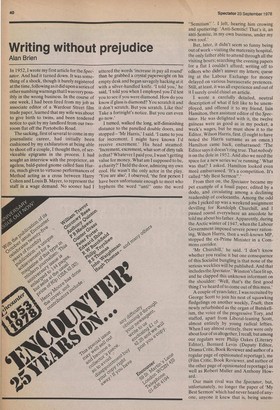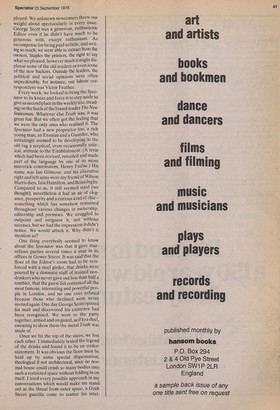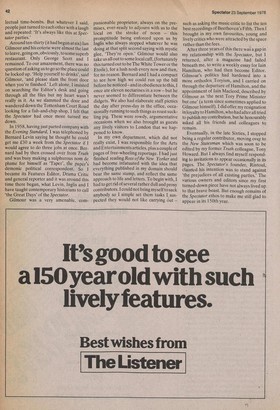Writing without prejudice
Alan Brien
In 1952, I wrote my first article for the Spectator. And had it turned down. It was something of a shock, though it barely registered at the time, following as it did upon a series of other numbing warnings that! was very possibly in the wrong business. In the course of one week, I had been fired from my job as associate editor of a Wardour Street film trade paper, learned that my wife was about to give birth to twins, and been tendered notice to quit by my landlord from our tworoom flat off the Portobello Road.
The sacking, first of several to come in my journalistic career, had initially been cushioned by my exhilaration at being able to shoot off a couple, I thought then, of serviceable epigrams in the process. I had sought an interview with the proprietor, an ageless, bald-pated gnome called Sam Harris, much given to virtuoso performances of Method acting as a cross between Harry Cohen and Louis B. Mayer, to represent the staff in a wage demand. No sooner had I uttered the words 'increase in pay all round' than he grabbed a crystal paperweight on his empty desk and began savagely hacking at it with a silver-handled knife. 'I told you,' he said, 'I told you when I employed you I'd test you to see if you were diamond. How do you know if glass is diamond? You scratch it and it don't scratch. But you scratch. Like this! Take a fortnight's notice. But you can even go now.' I turned, walked the long, self-diminishing distance to the panelled double doors, and stopped — 'Mr Harris,' I said. 'I came to you for increment. I might have known I'd receive excrement.' His head steamed: 'Increment, excrement, what sort of dirty talk is that? Whatever I paid you,! wasn't getting value for money. What am I supposed to be, a charity?' I held the door, admiring my own cool. He wasn't the only actor in the play. 'You are also', I observed, 'the first person I have been unfortunate enough to meet who hyphens the word "anti" onto the word "Semitism" '• I left, hearing him crowing and sputtering: 'Anti-Semitic! That's it, an anti-Semite, in my own business, under my own roof.'
But, later, it didn't seem so funny being out of work— visiting the maternity hospital, the only father able to attend through all the visiting hours; searching the evening papers for a flat I couldn't afford; writing off to editors who didn't answer my letters; queue ing at the Labour Exchange for money delayed on various bureaucratic pretences. Still, at least, it was all experience and out of it I surely could chisel an article.
I wrote a carefully detailed, neutral description of what if felt like to be unemployed, and offered it to my friend, fain Hamilton, then assistant editor of the Spectator. He was delighted with it, the twelve guineas were as good as in my pocket, a week's wages, but he must show it to the Editor, Wilson Harris, first. (I ought to have noted the Harris surname as an omen.) Hamilton came back, embarrassed: 'The Editor says it doesn't ring true. That nobody is on the dole in 1952. And also we need the space for a new series we're running.' What was that? I asked. Hamilton looked even more embarrassed. 'It's a competition. It's called "My Best Sermon".'
From then on, the Spectator became my pet example of a fossil paper, edited by a dodo, and circulating among a declining readership of coelocanths. Among the odd jobs I picked up was a weekend assignment devilling for Randolph Churchill, and I passed round everywhere an anecdote he told me about his father. Apparently, during the Arctic winter of 1947, when the Labour Government imposed severe power rationing, Wilson Harris, then a well-known MP, stopped the ex-Prime Minister in a Commons corridor.
'Mr Churchill,' he said. 'I don't know whether you realise it but one consequence of this Socialist bungling is that none of the serious weeklies will be published. And that includes the Spectator.' Winston's face lit up, and he clapped this unknown informant on the shoulder: 'Well, that's the first good thing I've heard of to come out of this mess.'
A couple of years later, I was recruited by George Scott to join his nest of squawking fledgelings on another weekly, Truth, then newly refurbished as the organ of Butskellism, the voice of the progressive Tory, and staffed, apart from Liberal-leaning Scott, almost entirely by young radical lefties.
When I say almost entirely, there were only about four of us altogether, I recall, but among our regulars were Philip Oakes (Literary Editor), Bernard Levin (Deputy Editor, Drama Critic, Book Reviewer and author of a regular page of opinionated reportage), me (Film Critic, Book Reviewer, and author of the other page of opinionated reportage) as well as Robert Muller and Anthony Howard.
Our main rival was the Spectator, but, unfortunately, no longer the paper of 'My Best Sermon' which had never heard of anyone, anyone it knew that is, being unem ployed. We unknown newcomers threw our weight about spectacularly in every issue. George Scott was a generous, enthusiastic Editor even if he didn't have much to be generous with, except enthusiasm. As recompense for being paid so little, and writmg so much, we were able to extract from the owners, Staples the printers, the right to say what we pleased, however much it might displease some of the old readers or even some of the new backers. Outside the leaders, the political and social opinions were often unpredictable, for instance, our labour correspondent was Victor Feather.
Every week, we looked to bring the Spectator to its knees and force it to step aside to give us second place in the weekly trio, treading on the heels of the brand-leader The New Statesman. Whatever else Truth was, it was great fun. But we often got the feeling that we were the only ones who realised it. The Spectator had a new proprietor too, a rich young man, an Etonian and a Guardee, who irritatingly seemed to be developing in the old rag a sceptical, even occasionally satirical, attitude to the Establishment. (A term which had been revived, retooled and made part of the language by one of its more maverick contributors, Henry Fairlie.) His name was Ian Gilmour, and his executive right and left arms were my friend of Wilson Harris days, lain Hamilton, and Brian Inglis. Compared to us, it still seemed staid (we thought), nevertheless it had an air of elegance, prosperity and a curious kind of chic— something which has somehow remained throughout various changes in ownership, editorship and premises. We struggled to outpoint and outguess it, not without sucesses, but we had the impression it didn't notice. We would attack it. Why didn't it mention us?
One thing everybody seemed to know about the Spectator was that it gave marvellous parties several times a year in its offices in Gower Street. It was said that the floor of the Editor's room had to be reinforced with a steel girder, that drinks were poured by a domestic staff of trained nondrinkers who never gave out less than half a tumbler, that the guest-list contained all the most famous, interesting and powerful people in London, and no one ever refused because those who declined were never invited again. One day George Scott opened his mail and discovered his existence had been recognised. We went to the party together, armed and on guard, as if to a duel, swearing to show them the metal Truth was made of.
Once we hit the top of the stairs, we lost each other. I immediately tested the legend of the drinks and found it to be an understatement. It was obvious the floor must be held up by some special dispensation, theological if not architectural, since no normal house could crush so many bodies into such a restricted space without folding in on itself. I tried every possible approach in my conversations which would make me stand out as the threat from outer space, a Grub Street guerilla 'come to scatter his intel lectual time-bombs. But whatever I said, people just turned to each other with a laugh and repeated: 'It's always like this at Spectator parties.'
Around ten-thirty (it had begun at six) Ian Gilmour and his coterie were almost the last to leave, going on, obviously, to some superb restaurant. Only George Scott and I remained. To our amazement, there was no question of asking us to go so the place could be locked up. 'Help yourself to drinks', said Gilmour, `and please slam the front door when you're finished.' Left alone, I insisted on searching the Editor's desk and going through all the files but my heart wasn't really in it. As we slammed the door and wandered down the Tottenham Court Road looking for a fish-and-chip shop, I felt that the Spectator had once more turned me down.
In 1958, having just parted company with the Evening Standard, I was telephoned by Bernard Levin saying he thought he could get me £30 a week from the Spectator if I would agree to do three jobs at once. Bernard had by then crossed over from Truth and was busy making a sulphurous nom de plume for himself as 'Taper', the paper's demonic political correspondent. So I became its Features Editor, Drama Critic and general reporter and it was around this time there began, what Levin, Inglis and I have taught contemporary historians to call 'the Great Days' of the Spectator.
Gilmour was a very amenable, corn panionable proprietor, always on the premises, ever-ready to adjourn with us to the local on the stroke of noon — this promptitude being enforced upon us by Inglis who always stopped whatever he was doing at that split second saying with mystic glee, 'They're open.' Gilmour would also take us all out to some local caff, (fortunately this turned out to be The White Tower or the Etoile), for a lush nosh every now and then, for no reason. Bernard and I had a compact to see how high we could run up the bill before he noticed—and in obedience to this,! once ate eleven nectarines in a row — but he never seemed to differentiate between the didgets. We also had elaborate staff picnics the day after press-day in the office, occasionally running to such things as roast suckling pig. These were rowdy, argumentative occasions when we also brought as guests any lively visitors to London that we happened to know. In my own department, which did not really exist, I was responsible for the Arts and Entertainments articles, plus a couple of pages of free-wheeling reportage. I had just finished reading Ross of the New Yorker and had become infatuated with the idea that everything published in my domain should bear the same stamp, and reflect the same approach to life and letters. To begin with, I had to get rid of several rather dull and prosy contributors. I could not bring myself to sack anybody so I simple set them tasks I suspected they would not like carrying out — such as asking the music critic to list the ten best recordings of Beethoven's Fifth. Then I brought in my own favourites, young and lively critics who were attracted by the space rather than the fees..
After three years of this there was a gap in my relationship with the Spectator, but I returned, after a magazine had, failed beneath me, to write a weekly essay for lain Hamilton, who had then become Editor. Gilmour's politics had hardened into a more orthodox Toryism, and I carried on through the departure of Hamilton, and the appointment of lain Macleod, described by Gilmour as `the next Tory Prime Minister but one' (a term since sometimes applied to Gilmour himself). I did offer my resignation in loyalty to Hamilton, who had after all tried to publish my contribution, but he honourably asked all his friends and colleagues to remain.
Eventually, in the late Sixties, I stopped being a regular contributor, moving ovei to the New Statesman which was soon to be edited by my former Truth colleague, Tony Howard. But I always find myself responding to invitations to appear occasionally in its pages. The Spectator's founder, Rintoul, clainied his intention was to stand against 'the prejudices of all existing parties.' The various owners and editors since my first turned-down piece have not always lived up to that brave boast. But enough remains of the Spectator ethos to make me still glad to appear in its 150th year.




































































































 Previous page
Previous page